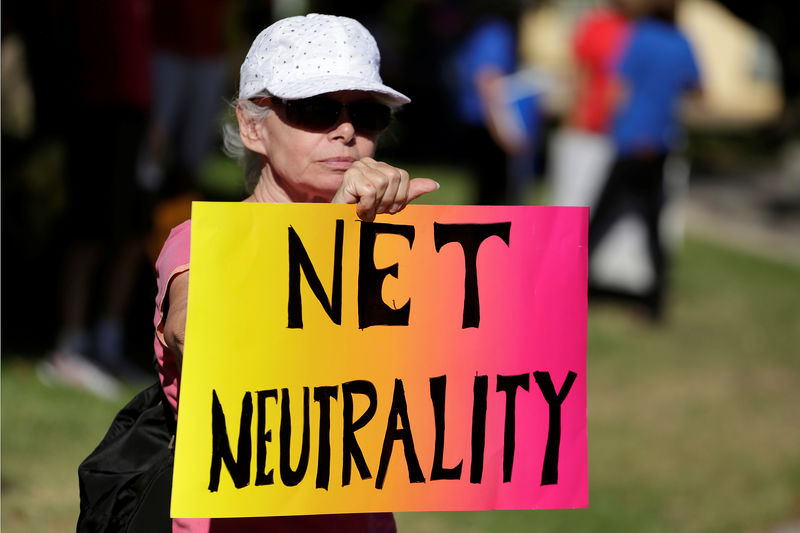By David Shepardson
WASHINGTON (Reuters) - Internet providers could face a variety of state internet regulations after a U.S. court ruled on Tuesday that the federal government cannot block states from passing their own net neutrality laws, while largely upholding the 2017 repeal of landmark rules barring providers from blocking or throttling traffic.
The U.S. Court of Appeals for the District of Columbia said the Federal Communications Commission erred when it declared that states cannot pass their own net neutrality laws and ordered the agency to review some key aspects of its 2017 repeal of rules set by the Obama administration. But it left open the possibility the FCC could seek to block state efforts on a case-by-case basis.
The decision could subject internet providers to a variety of state regulations on internet traffic. Verizon Communications Inc (NYSE:VZ) said the ruling "underscores the need for Congress to adopt national legislation that provides protections for consumers while avoiding a disruptive, inconsistent patchwork of state Internet regulation."
The court also found that the FCC acted properly when it overturned a 2015 decision that had classified broadband internet as a utility-style service that handed the FCC sweeping authority to regulate it and instead classified it as less regulated information service.
But the court also found the agency "failed to examine the implications of its decisions for public safety" and must also review how its decision will impact a government subsidy program for low-income users.
The decision means the more than 10-year-old debate over net neutrality will continue to drag on for months or more likely years as Congress has refused to pass legislation that would end the debate.
The 2017 FCC decision handed internet providers sweeping powers to recast how Americans use the internet, as long as they disclose changes. The new rules took effect in June 2018, reversing rules adopted under former President Barack Obama in 2015 which barred internet service providers from blocking or throttling traffic, or offering paid fast lanes, also known as paid prioritization.
FCC Chairman Ajit Pai said the decision affirmed the FCC's "decision to repeal 1930s utility-style regulation of the internet. A free and open internet is what we have today. A free and open internet is what we’ll continue to have going forward."
Pai added that the FCC would address "the narrow issues that the court identified."
John Bergmayer, legal director at Public Knowledge, said the decision "leaves states with a clear path forward to enact state net neutrality laws to protect internet users and provide certainty for participants in the digital economy. States should move expeditiously to protect consumers where the FCC has refused to do so."
A senior FCC official told reporters on a conference call that the decision is "not a green light" for states to pass any internet rules they want and said the FCC has not decided whether to appeal portions of the decision.
Championed by large tech companies and consumer groups, net neutrality was formally adopted by the FCC in 2015. Major telecommunications companies argued it limited their ability to offer new services to content providers, and under the Trump administration, the FCC overturned the policy.
California adopted sweeping state net neutrality protections in October 2018 but agreed not to enforce the measure pending the court challenge.
House Speaker Nancy Pelosi, a California Democrat, said the decision was a "disappointing blow to the promise of a free and open internet" but she said "California’s leadership in enacting the strongest net neutrality protections in the country is a model that will ensure that the internet remains an engine of innovation, job creation and free speech for all Americans."
California Attorney General Xavier Becerra said the decision "blocks the FCC's effort to preempt state net neutrality laws through regulation."
The court threw out the part of the order that barred all states from setting net neutrality rules.
"The commission lacked the legal authority to categorically abolish all 50 states statutorily conferred authority to regulate intrastate communications," the court said.
The FCC could still make "provision-specific arguments" to seek to block individual aspects of state net neutrality rules.
Judge Stephen Williams (NYSE:WMB) wrote in his dissenting opinion that "On my colleagues’ view, state policy trumps federal; or, more precisely, the most draconian state policy trumps all else."
The Internet Innovation Alliance, a group representing companies including AT&T Inc (NYSE:T), said the decision "allowing rules that differ among all 50 states could spell disaster for advancement of the internet."

The Trump administration rules were a win for internet providers like AT&T, Comcast Corp (NASDAQ:CMCSA) and Verizon but opposed by companies such as Facebook Inc (NASDAQ:FB), Amazon.com Inc (NASDAQ:AMZN) and Alphabet (NASDAQ:GOOGL) Inc.